|
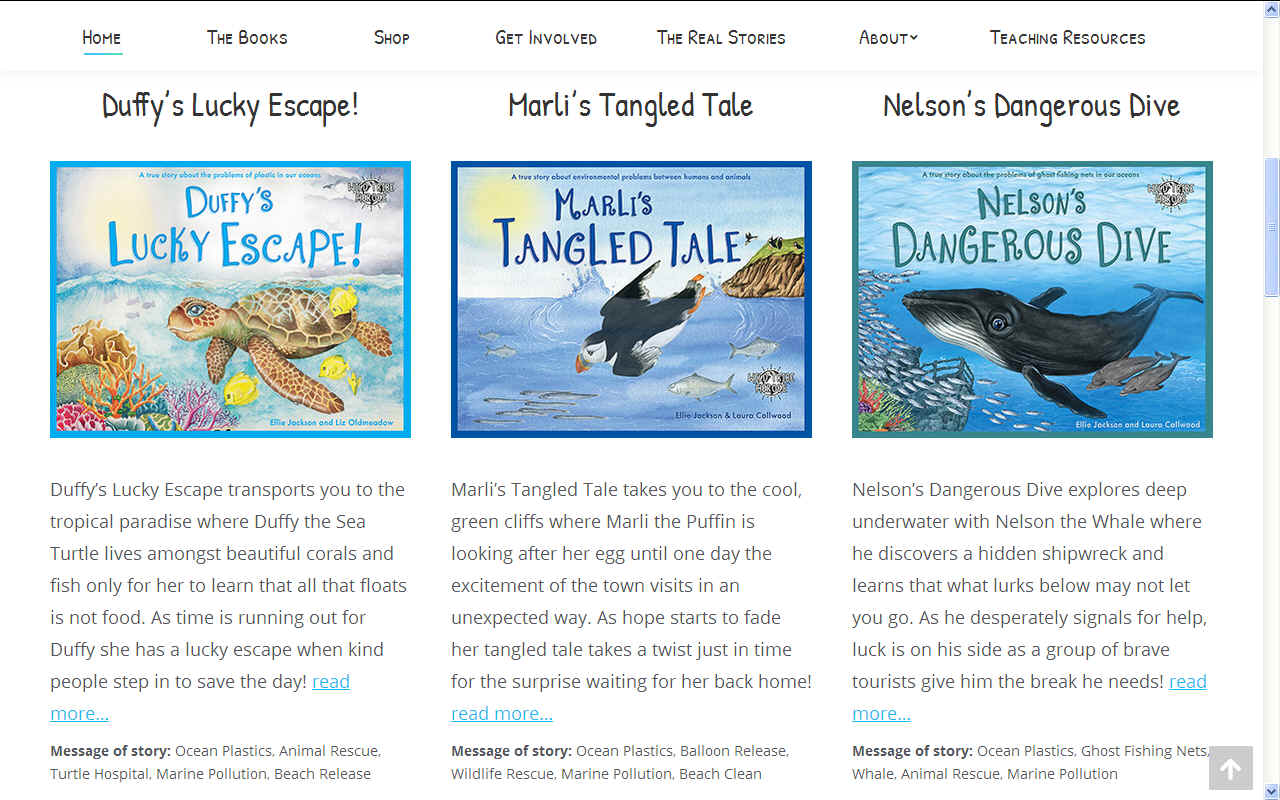
Over 8,500 copies have been sold around the world in just over a year, particularly in the UK, Australia & New Zealand and the USA. They are being translated into many different languages including Welsh, French, Hindi, Indonesian, German, Spanish, Turkish, Norwegian and Arabic which are currently available as ebooks.
They are stocked with the National Trust, RNLI, Eden Project, Falmouth Maritime Museum, Surfers Against Sewage, 2 Minute Beach Clean,
Marine Conservation Society UK, Wildlife Trust and Fathoms Free as well as many book shops, museums, art galleries, gift shops, zero waste and farm shops around the country as well as numerous online stores.
Over 500,000 children around the UK in libraries, schools and preschools have been using the Wild Tribe Heroes books to learn about the problem of ocean plastics. Through our Books Into Schools project, local businesses, individuals, organisations, councils, parents and grandparents can help inspire thousands of children across their community to get involved and take action.
Each school receives an Educational Pack of the three books plus teaching ideas and digital resources and the aim is to target an entire region at the same time. The result of children reading the books in schools is remarkable. They are organising litter picks and beach cleans, setting up recycling stations and importantly, using their persuasive writing skills to write to local business asking them to stop their use of single use plastic. Between these thousands of children they will have links to every single business in the community and so the children become the teachers, inspiring their
families, schools and wider business communities to make the changes our environment so desperately needs us to make. This is creating cleaner and healthier towns and environments, coastal regions and cities.
Ellie lives by the sea in Looe,
Cornwall. She wrote her first book after living on Magnetic Island in the Great Barrier Reef in
Australia. She
became inspired when her young family saw a turtle called Duffy being released back into the ocean after a year of treatment for ingesting
plastic.
She is quoted as saying: “My children and I were transfixed by the sight of this beautiful creature being set free, and subsequently visited a turtle hospital on the mainland to find out more. Once my children had made the link between plastics and turtles they were inspired to pick up litter from beaches so that they could help protect turtles and other sea life.”
Ellie Jackson is a mother of four young children who has written a series of books to help
educate children about the impact of plastics on ocean ecosystems.
Ellie is an environmental scientist. She taught geography for six years. She conceived her idea to use children’s books as a way of educating young people about the threat to sea life of our dependence on plastic.
The
Wild Tribe Heroes books have received personal letters of congratulations from
Sir David Attenborough and
Prince Charles who are both extremely concerned about the issue of ocean plastics and are doing everything they can to help raise awareness. The books have been featured on the BBC, in
The Guardian, Mail on Sunday and Huffington Post as well as numerous local newspapers,
radio and TV and also featured in international podcasts, blogs and press.
NELSON'S DANGEROUS DIVE
Nelson’s Dangerous Dive goes deep underwater with Nelson the Whale where he discovers a hidden shipwreck and learns that what lurks below may not let you go. As he desperately signals for help, luck is on his side as a group of brave tourists give him the break he needs!
The third book in the Wild Tribe Heroes series, Nelson’s Dangerous Dive is the engaging story of the relationship between the actions of humans and wildlife and the dangers they face in their own natural habitats. Nelson’s Dangerous Dive is perfect as a bedtime story or to share with your
school or preschool. It is an exciting story based on the true events after a humpback
whale became entangled in ghost fishing nets.
Stunning artwork captures the imagination of young readers and brings to life the very real threat lost or abandoned
fishing nets pose to our environment. Nelson’s Dangerous
Dive shares a powerful message which invites children and adults alike to question their actions and the effects on our environment. With suggestions to support sustainable fishing and ideas for the future together with activities which reinforce the story, Nelson’s Dangerous Dive is a book which will inspire your own little Wild Tribe Hero to want to take care of nature and their environment by making changes to the world around them.
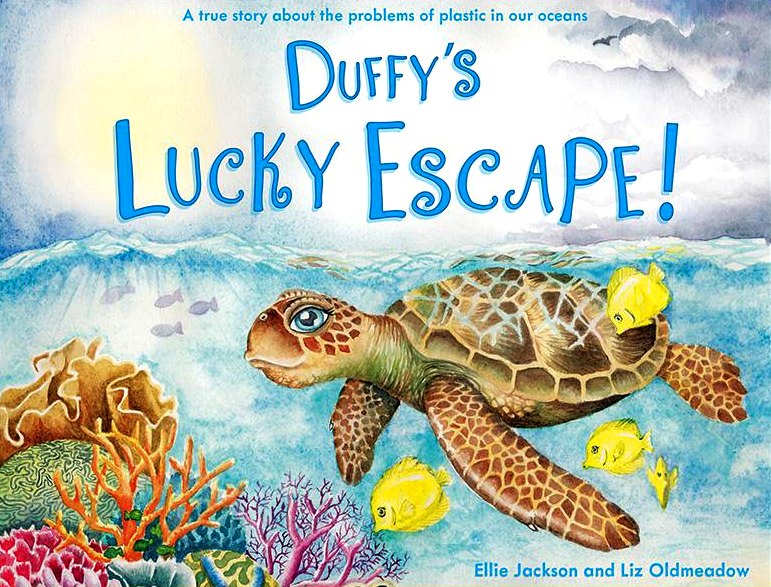
DUFFY'S
LUCKY ESCAPE
This
was the first book in the Wild Tribe series based on a true story. Follow Duffy the Sea Turtle as she has a lucky escape from the harmful effects of marine plastics in the Great Barrier Reef. Learn how turtles confuse plastics for food.
This story helps children to understand the link between plastic and wildlife.
It's a perfect bedtime story and a share with your school. Great for parents, grandparents, preschool and primary schools.
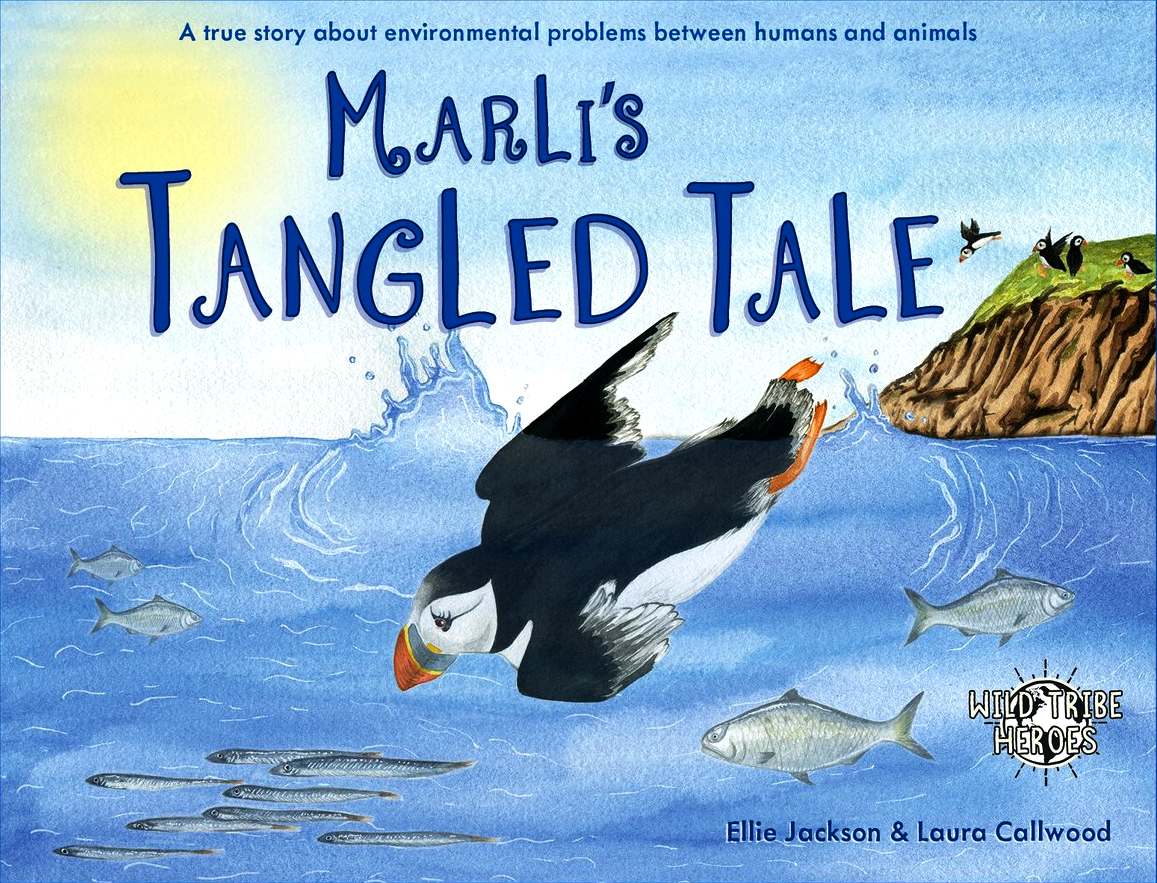
MARLI'S
TANGLED TALE
The second book in the Wild Tribe Heroes series, Marli's Tangled Tale is a true and gentle story about the global problem of plastic rubbish, highlighting to children the relationship between humans and wildlife and the dangers animals face in their own natural habitats. Stunning artwork captures the imagination of young readers and brings to life a very real threat to our world.
Paperback
21 x 27cm (9 x 11") Written by Ellie Jackson, Illustrated by Liz Oldmeadow
Stori wir am broblemau plastig yn ein moroedd. Mae Dihangfa Lwcus Duffy yn stori afaelgar am blastig yn y môr, sydd yn broblem fyd-eang. Mae'n pwysleisio, ar gyfer plant, y berthynas rhwng pobl a bywyd gwyllt, a'r peryglon sy'n wynebu môr-grwbanod yn eu cynefinoedd naturiol eu hunain.
The following has been provided by the Publisher:
Mae'r celfwaith trawiadol yn dal dychymyg darllenwyr ifanc ac yn dod â'r bygythiad go iawn sydd i'n moroedd yn
fyw.
Mae Dihangfa Lwcus Duffy yn seiliedig ar ddigwyddiadau gwirioneddol. Mae'r neges bwerus hon yn gwahodd plant ac oedolion fel ei gilydd i gwestiynu effaith llygredd plastig ar ein
hamgylchedd.
Gyda syniadau a gweithgareddau sy'n atgyfnerthu'r stori, mae Dihangfa Lwcus Duffy yn llyfr a fydd yn ysbrydoli plant i wneud newidiadau i'r byd o'u hamgylch.
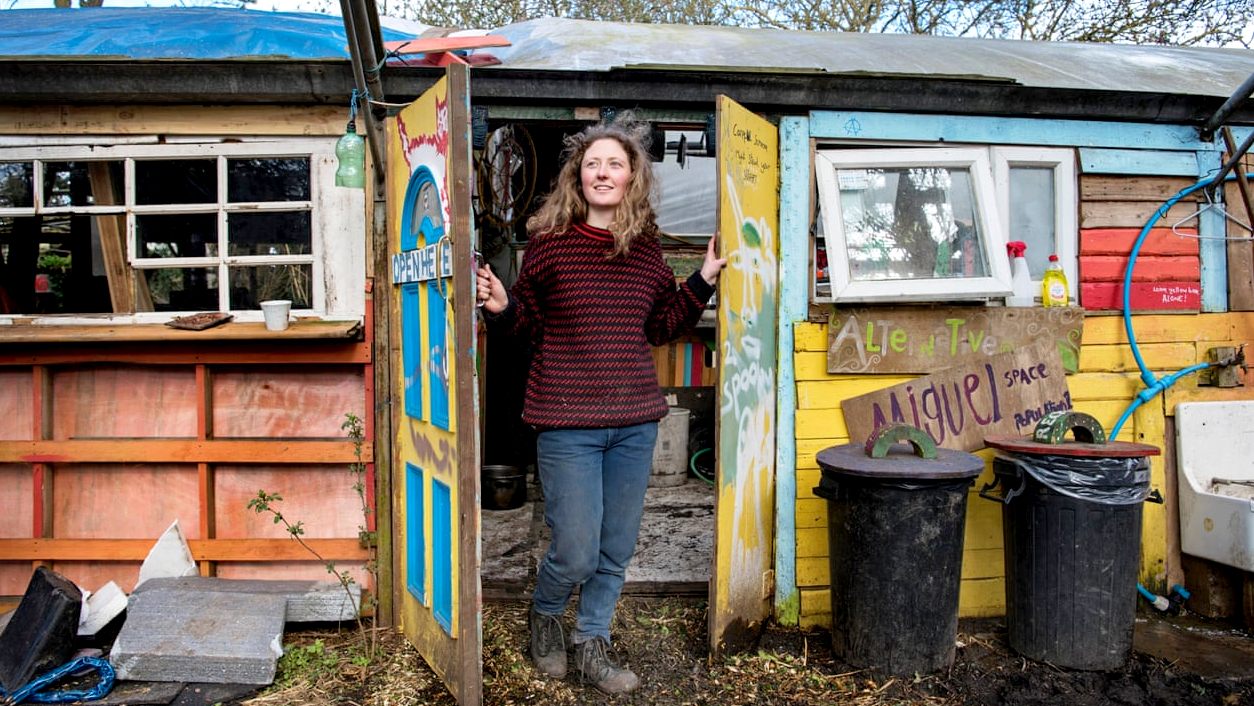
THE
GUARDIAN MARCH 14 2019 - 10 WILD LIFE HEROES Schoolchildren around the world are joining a global strike against climate change this week. But they’re not the only everyday people inspired to take action. We talk to 10 UK activists on the frontline of our most serious environmental issues.
Chay Harwood, Swindon - Activist
Extinction Rebellion is an environmental direct action group.
If you had told me a few years ago that I would be involved in an environmental movement, I would have thought you were joking. I was far more interested in social inequality and minority rights. But I came to realise that the environment crisis is the biggest threat to us all, and it is people from my background – more disadvantaged, ethnic minority – who are going to bear the brunt of what is coming.
The environment is often seen as a white, middle-class issue, while people from my demographic have other things to worry about, such as putting food on the table and paying the bills. But I went along to the first Extinction Rebellion meetings and found that they were organised and people were prepared to do what it takes to make a change: sleeping on office floors, working until 4am, or running around London in the rain, blocking roads – all of which I have done.
Being part of that is incredibly inspiring – after a successful action, you can really feel the electricity in the room. But it is also emotionally draining. I was involved in the swarming protests blocking roads, and I saw that we were making life harder for people who were just trying to get to work. But when I raised that point, my voice was heard, and so we are working hard to take actions that only directly impact the elite, who are complicit in creating environmental harm .
We have a huge movement building towards Rebellion Day on 15 April and it is incredibly exciting to see it come together. I want to let people know that this is their fight too. Climate justice is tied up with fights for equality and our wider rights – if we don’t take this on, then everything else will be lost. We cannot afford to stand by and do nothing. MT Rosamund Adoo-Kissi-Debrah, London
- Air pollution advocate
Founded the Ella Roberta Family Foundation, in memory of her nine-year-old daughter who died in 2013. She is campaigning for a new inquest into her daughter’s death, which she believes is linked to air pollution.
My daughter suffered terribly – she would stop breathing, have seizures and I would take her to A&E – but no one could explain why it was happening. When she died, I wanted answers. I wanted to know how she became so ill, so quickly; how she died so quickly.
She died of an asthma attack, but all the doctors could come up with as a trigger was “something in the
air”. She was allergic to pollen, but the consultant said there was no way that her seizure was an allergy to pollen. The first inquest did not come up with any answers.
I did not think of air pollution. This was new to me. If you’re a scientist and this is your specialist area, it might not be surprising, but I didn’t know about particulates and nitrogen dioxide.
Awareness is key, and so is education – I would say that, as I am a teacher. We should be told more about monitoring air pollution. We have a right to know. So many children are at risk – we believe that the deaths of 16 children in the past 18 months are linked to air pollution. Children continue to get ill, to die. Voices are not being heard. If parents could speak about their experiences – telling a politician not just, “I am worried about my children”, but that “My child had to be resuscitated in A&E last night” – it might make a difference.
Two weeks ago, my friend went to buy a new car, and they tried to sell her a diesel car – they told her it was “green”. Who is allowing people to say this in 2019?
I continue to be devastated [by Ella’s death], it is still unbearable. What I am learning is how I can use what I have been through to help other young children. I don’t feel like giving up. I feel very strongly that people should shout about this. FH Julie Daniels, Blackpool
- Anti-fracking campaigner
The Lancashire Nanas are a group of women who have been opposing fracking at Preston New Road since 2011.
I hadn’t even heard of fracking until 2011. That’s when the energy firm Cuadrilla started fracking, just outside Blackpool, and caused a series of small earthquakes. I had been busy bringing up my three daughters – and latterly, my four grandchildren – and hadn’t really been paying much attention to where my electricity or gas came from. Then I saw an advert in the Blackpool Gazette inviting people to a meeting to learn more about fracking.
I went along with my sister and the more we heard, the more concerned we became. Everything we read convinced us that fracking was not a safe or well managed industry. Around that time I was made redundant from my IT job and so my husband and I agreed I would focus on campaigning full-time, and we would just tighten our belts.
The idea of the Nanas came because we realised that the media liked to portray people raising these concerns as tree-huggers. We were just normal, everyday women concerned about something on our doorstep. There were 25 to 30 of us at the start, aged between 30 and 70. Now, there are Nanas in their 80s. Not everyone is actually a nana. We just liked the idea of portraying ourselves as matriarchs: you don’t mess with your grandma, do you?
It was absolutely devastating in October 2016 when the government gave Cuadrilla the go-ahead to frack at Preston New Road. But we didn’t give up. We were at the gates every day, doing what we could to prevent or slow down vehicles entering the site. The funniest day was when a group of women sat in the road, knitting. It all looked so innocent. The police didn’t notice until it was too late that the women were knitting themselves together. It was a total farce, watching 50 Lancashire police officers try to cut them apart, tripping over wool and pulling them left and right.
Fracking didn’t go as Cuadrilla hoped. The drilling produced seismic tremors that breached legal limits. They planned to do more than 40 fracks but only managed two. I would say I am cautiously optimistic they won’t be back. Shares in Cuadrilla’s parent company are down and finally more Tory MPs are coming out against it. And if we can end it here, we might be able to end it everywhere. HP 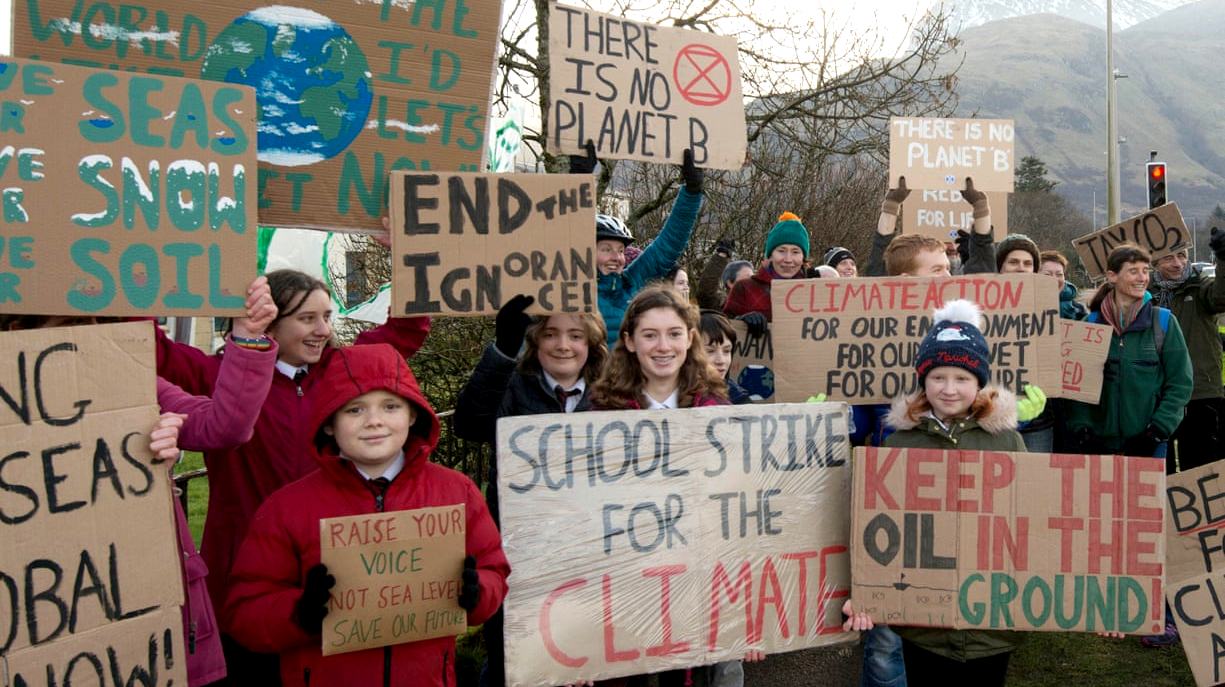
Holly Gillibrand, Fort William - School striker
The #FridaysForFuture global school strike takes place tomorrow, inspired by Swedish activist
Greta Thunberg
It took about a month to persuade my parents that striking was a good idea. I’m 13 and I had seen a video of
Greta Thunberg on Twitter, and I thought that was something I could do too. I asked some of my friends, but only one joined me; now we’re averaging about four students and 15 adults .
At the first strike, it was quite scary because I didn’t know what people’s reactions would be. It really helped having my friend there. We tried to ignore the people in cars, sitting and pointing at us, but there were a lot of people beeping in support.
My mum phoned my head teacher about a week before I started. He can’t support it and he says my school has a lot of climate and environmental education, but I don’t think it does. I get laughed at quite a bit. I’ve met quite a few climate-deniers in school. It makes me really annoyed because people don’t understand, or they don’t care when you try to explain it to them.
I’m surprised at how the movement has taken off. Education is valued and if children are sacrificing that, it must be important. The government’s response has been pitiful. At the climate change debate, 610 MPs skipped it – that’s a shocking representation of how little our political leaders care about the very existence of life on this planet.
I think there will be hundreds of thousands [of children striking on the 15th]. I wish people knew that we can’t change this unless everyone is working together. ES
Lukas Buricin, Derbyshire - Vegan campaigner
Manchester Animal Action is an organisation aiming to change society’s attitude towards animals
I grew up on a little family farm in the Czech Republic and when I was a kid I was taught to kill animals. It was absolutely normal. I also worked in a chicken slaughterhouse in England when I was 25 to earn some money. That was like hell on earth.
I started reading about climate change. One day I learned that there is massive environmental damage and climate change caused by animal agriculture – 80% of deforestation is caused by agriculture. All my illusions about being an environmentalist disappeared. I thought: “I just can’t be this person any more.” I became a vegan six years ago.
Every Sunday, we have a stall on Market Street in Manchester – we put out lovely vegan food and leaflets. The ethical aspect doesn’t seem to worry people. So I try to switch the discussion to the environment – people are often shocked and start googling.
I also emailed all the [500] employees at my work explaining my views. I got plenty of positive feedback; I did also get people ridiculing it, but I was not offended. The fact is that laughing is better than ignorance.
My children have never eaten meat. We used to get their blood tested every six months for iron, vitamins D and B12 etc, but the doctor said we should stop coming back as the results were always perfect.
My advice to people who want to talk about veganism would be: stay calm, don’t be judgmental, and never give up trying to help people see there are good reasons for being vegan. In the future, our children will thank us. DC
Hugo Tagholm, Cornwall - Marine conservationist
Chief executive of the charity Surfers Against Sewage, who turned their focus to plastic pollution 10 years ago
My love of the shoreline and ocean really spans back to the great tidal banks of the Thames, where my father used to take me mudlarking, and exploring UK beaches on family holidays. It is there that the fascination with flotsam and jetsam started. I’ve been surfing in one form or another since I was about 10. Surfing is a perfect nexus between my passion for the environment and my love of sport.
In 1991, I entered the Surf to Save competition in Polzeath, which supported NGOs, including the newly formed Surfers Against Sewage. I met some of the founder members – gas mask-wearing, surfboard-waving activists taking to the streets of London. The early days were a true wave of people power that coincided with brilliant new European legislation to clean up our ocean from sewage pollution. The past 30 years have seen water quality at beaches improve dramatically.
But the public have been shielded from the growing extent of plastic pollution We have worked for a decade auditing plastic on our beaches, running beach cleans, calling for legislation and industry action. Blue Planet II had only 14 minutes on plastic, out of seven hours of broadcasting, but it changed how the world sees plastic. It helped to propel our work to a bigger stage.
Now, a dynamic movement of people, which we describe as #GenerationSea, has come together to help us call for new government policy and legislation, and changes within industry. FH
Sally Goldsmith, Sheffield - Tree activist
Sheffield Tree Action Groups formed to stop Sheffield council felling as many as 17,500 trees in the city. In the past five years, 5,500 have been chopped down by contractors for the Labour council.
When they started taking the trees down, it took a while for people to realise the extent of it. It is so upsetting to see these magnificent trees felled; it has turned me and others into a city of environmental activists. I have taken more direct action in the past few years than I have ever done before. About four of us are older women; we call ourselves the Tree Sisters.
People say we chain ourselves to the trees, but we stand under them. Around Christmas 2017, we were on watch for trees we knew were going to be felled. It meant getting up very early – you never know when they are going to come – and being on the lookout all day long, in the winter cold, to get out there before the contractors reached the tree. It was just punishing hours and it was shit.
The advantage was you could see them arriving to put barriers around the trees. They employ security men, who were previously bouncers, and the police can get involved. In a lot of cases, 60 men will arrive to fell one tree.
This time it was just the barrier men and a team of security. The security man was trying to tell me it was illegal for me to be there – it wasn’t. I didn’t move and they put the barriers up around me. I was feeling a bit shaken because it is a scary situation, and I am 66 and a pensioner. But friends were gathering round to support me, and it was cold, so I thought: “Let’s sing some carols.”
I started singing The 12 days of Christmas, replacing the words with: “A goldfinch in a plane tree and 12 barrier men.” In the end, when they left without felling the tree, one of the men said to me: “Thank you, we have really enjoyed that.” SL
Indigo Rumbelow, London - Climate campaigner
Grow Heathrow is an eco-squat on 30 acres of land, adjacent to the site of the proposed third runway.
I grew up on a small farm in the Gower, Wales, which is a really beautiful place and so I have always been connected to nature. But my first direct action was marching against student cuts. It was the first time I got really angry and realised that the people in charge are not always right, they don’t always know the answers and I needed to get my voice heard out there.
Two years ago, I went to my first mass action, protesting about the coal mining in a massive area of the Rhineland, Germany. Our group stopped a train from delivering to a power plant. We linked our arms and sat down on the train track. You have an adrenalin rush like you have never felt before.
It was there that I heard about the Grow Heathrow camp. Living here gives me the freedom to get involved in lots of environmental campaigns, anti-fracking and protests against open cast coal mining in the Pont Valley. We are all one movement, united in fighting for environmental justice.
The way society is living now is not sustainable. We have to act now or regret it later. SL
Gillian Lobo, London - Environmental lawyer
Works with ClientEarth charity that uses the law to protect the planet and the people who live on it
I don’t feel I am a hero. I’m a lawyer. I use the law to protect the environment and people’s health. We are a legal NGO that works on climate litigation and strategic cases that can help to develop the law, to compel
governments to put proper environmental measures in place.
I didn’t start out this way. I used to be a defence lawyer, representing companies that were sued. Now, I have changed sides. We are working at the cutting edge of the law. Things are moving rapidly. Before I joined ClientEarth four years ago, people I knew thought climate litigation was far-fetched. But now cases are being brought in the US, the Philippines and Europe.
In the UK, our biggest victory was over air pollution, which is closely linked to emissions cuts. The first case went all the way to the supreme court and the European court of justice.
Climate change is so amorphous that it affects everything – how much
food we can grow, whether our homes are flooded, what damage payouts insurance companies have to make. All these areas involve legal risks. In the future, I think you will see more individuals seeking to hold governments to account to reduce emissions. You could see more claims against companies for not doing enough. And there will be more challenges related to human rights, by the people impacted by climate change. Lawyers will be busy.
The past four years has made me very concerned about the need to drive down
CO2 emissions and how interesting and helpful the law can be. Used incisively and carefully, it can deliver change and major shifts in thinking. I’ve learned that there are opportunities to be creative. You don’t expect that with the law, do you? JW
Mya-Rose Craig, Somerset - Wildlife and environmental diversity campaigner
A birder and activist from the Chew Valley, she campaigns for endangered wildlife and organises nature camps for inner city minority ethnic teenagers
I’m 16 and my parents have taken me bird watching since I was a baby. It has always been part of my life. When I was seven, my parents heard that the first ever eastern crowned warbler had been seen in Britain. Luckily, I had a day off school, and we drove five hours to see it. It was around the edge of a huge quarry like an amphitheatre and I was amazed to see so many people cared about this little brown bird.
I’ve been very lucky to travel around the world. During half-term in Spain recently, I saw my 5,000th bird species in the world. It was a rock bunting, which is a brilliant bird.
My parents have always been very open about what is going on in the world. I was 12 or 13 and had built up a relatively large online following when I started campaigning. The first proper campaign I launched was to save the spoonbill sandpiper in Bangladesh, where my mum is from. I also campaigned over the 2014 oil spill in the mangrove forests of the Sundarbans.
In 2015, I read an American Birdwatching Association article about how the environmental sector is incredibly white. It made me stop and think. I knew I was the only one like me as a kid. I just felt sad because others should have that opportunity. Since then I’ve campaigned to bring diversity into
wildlife conservation. In three-and-a-half years, I’ve seen so much change.
People forget that we are animals, too. The NHS has started prescribing going out into nature because it is good for our mental health. If we care for nature, it’s not entirely altruistic. We get benefits, too. PB
By Helen Pidd,
Damian
Carrington, Matthew
Taylor, Fiona
Harvey, Sandra Laville,
Emine Saner,
Jonathan Watts and
Patrick Barkham
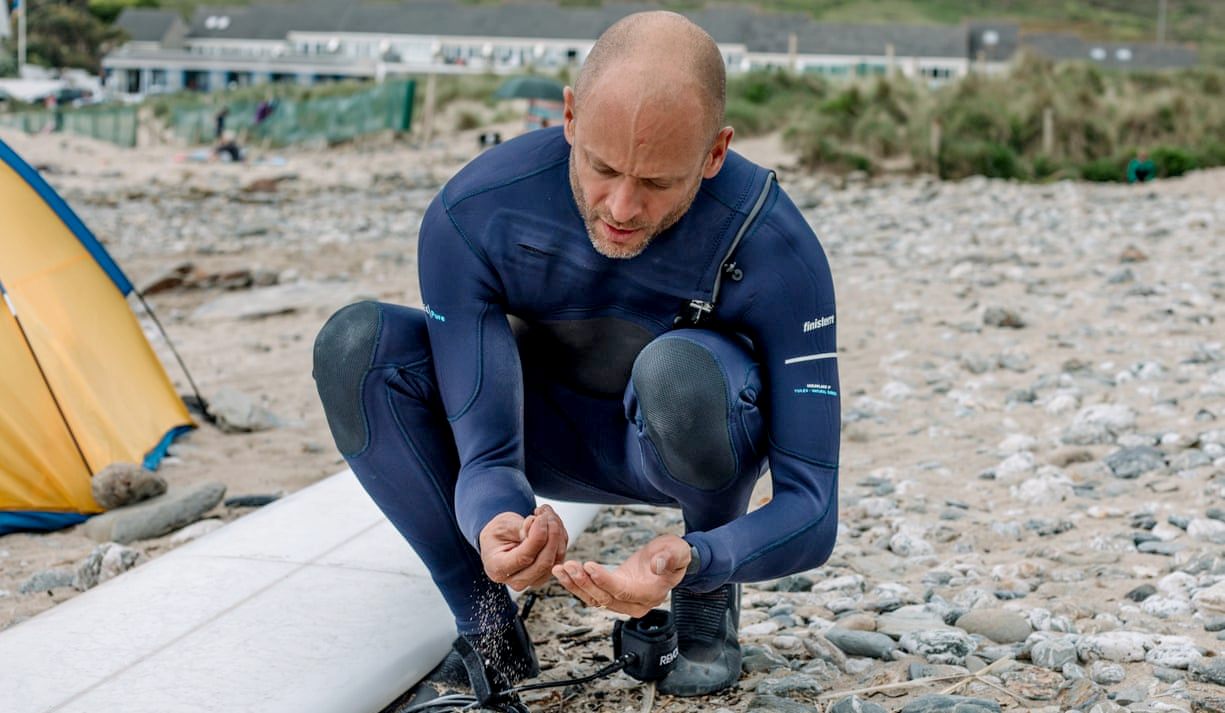
LINKS
& REFERENCE
https://www.theguardian.com/environment/2019/mar/14/we-cant-afford-to-stand-by-and-do-nothing-10-everyday-heroes-fighting-to-save-the-planet https://shop.rnli.org/products/marlis-tangled-tale https://muckrack.com/ellie-jackson http://www.gwales.com/goto/biblio/en/9781999748524/ https://enchantedplanet.co.uk/shop/toys/books/nelsons-dangerous-dive-by-ellie-jackson/ https://noplasticshop.co.uk/products/duffys-lucky-escape-by-ellie-jackson-liz-oldmeadow https://wildtribeheroes.com/
hello@wildtribeheroes.com
https://wildtribeheroes.com/teaching-resources/
NOVELIST
INDEX
A - Z
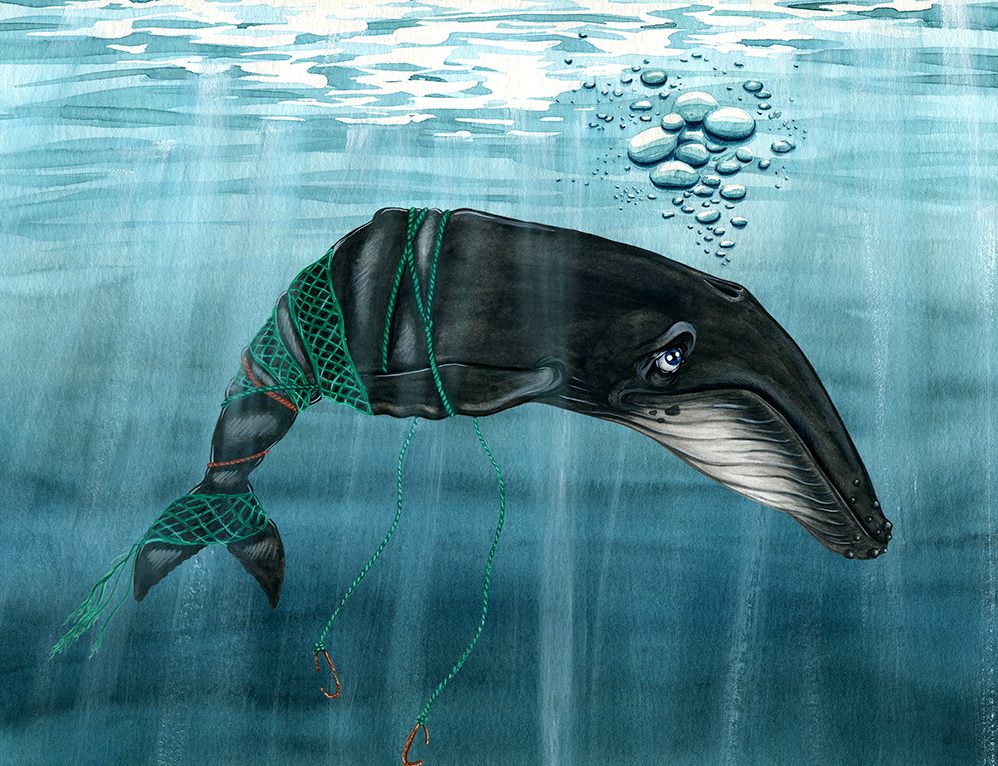
In Looe, Cornwall, an ethical loan inspires children to fight the plague of plastic pollution. Former teacher turned author Ellie needed a £12,500 loan to enable her to publish her children's books inspiring people to clean up their local beaches, after she and her family were part of a turtle release in Australia. My brother's tragic death at sea led me to write the books we dreamt up together - metro.co.uk — ‘Has anyone seen wee man Dom? He has been out kayaking and I haven’t heard from him – am starting to worry…’This was the Facebook post that began my nightmare. My brother Dom Jackson was an experienced and fit outdoor adventurer who loved the wilds of Scotland – and he was now reported missing in freezing conditions after setting out for a short kayaking trip. As with many accidents it was a series of events which led to his tragic death.
ABS
- BIOMAGNIFICATION
- CANCER
- CARRIER
BAGS - CLOTHING - COTTON
BUDS - DDT
- FISHING
NETS
FUKUSHIMA
- HEAVY
METALS - MARINE
LITTER - MICROBEADS
- MICRO
PLASTICS - NYLON
- OCEAN
GYRES - OCEAN
WASTE
PACKAGING
- PCBS
- PET
- PLASTIC
- PLASTICS
- POLYCARBONATE
- POLYSTYRENE
- POLYPROPYLENE
-
POLYTHENE - POPS
PVC - SHOES
- SINGLE
USE - SOUP
- STRAWS
- WATER
|






